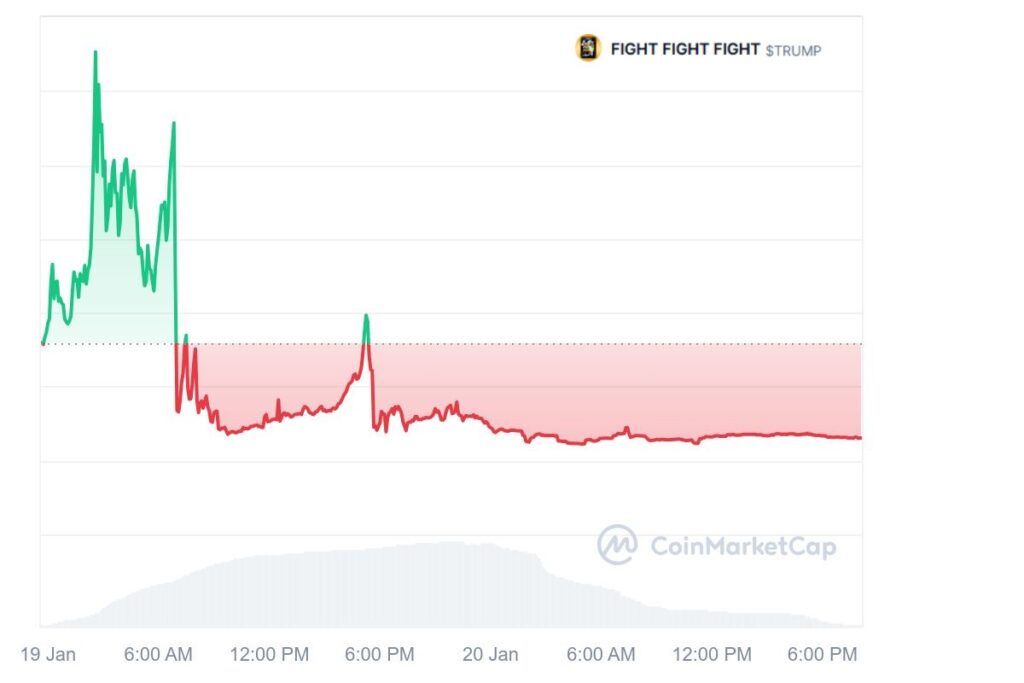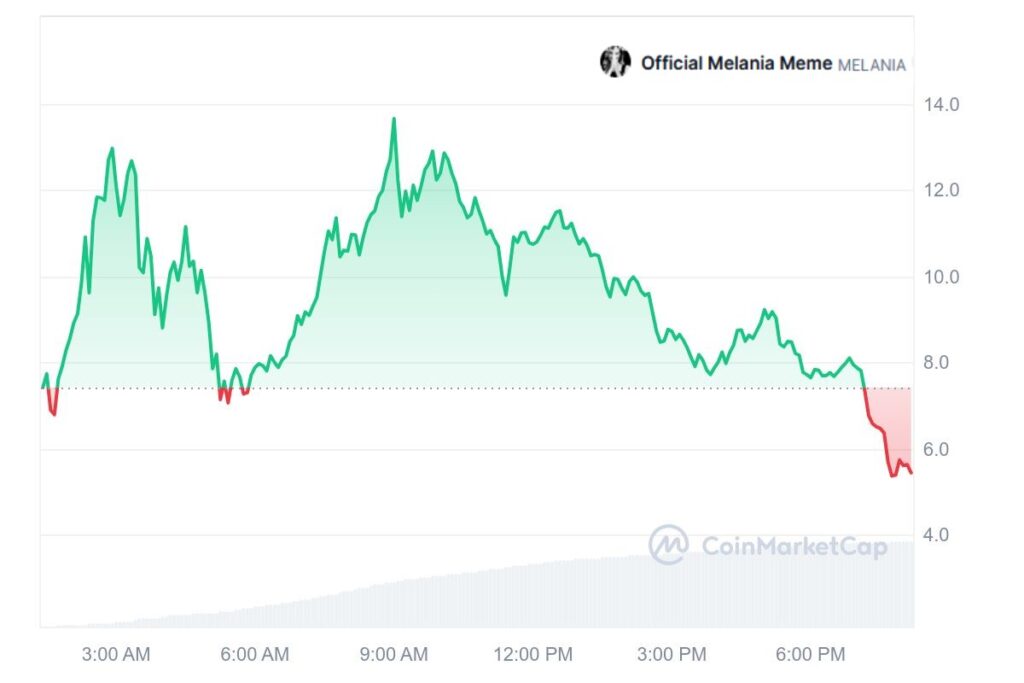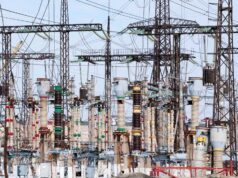The Trump memecoin frenzy is causing ripple effects across the blockchain ecosystem. Solana is struggling to handle the transaction surge while Ethereum attracts institutional investments linked to the Trump crypto boom. As speculation drives trading volume into the billions, network congestion, soaring gas fees, and blockchain stability are now central concerns. Meanwhile, World Liberty Finance (WLF)’s aggressive Ethereum purchases suggest a strategic pivot toward more politically affiliated crypto projects. With these shifts, the industry is left wondering: Are Trump-linked assets fueling innovation? Or, are they setting the stage for blockchain turmoil?
Solana Buckles Under the Weight of Trump Memecoins
The launch of Donald Trump’s $TRUMP and Melania Trump’s $MELANIA tokens on Solana has pushed the network to its limits. The meme coins attracted billions in trading volume within days, leading to record-high transactions, surging fees, and periods of congestion.
Solana has historically marketed itself as a high-speed, low-cost blockchain, often outperforming Ethereum regarding scalability. However, the overwhelming demand for Trump-themed tokens has stressed its infrastructure. Developers and traders are concerned about network resilience and stability. This situation has reignited debates over whether Solana can truly handle massive spikes in demand, especially as meme coins continue to drive speculation-driven activity.
Solana’s fees skyrocketed at the height of the trading frenzy, surpassing levels seen in past congestion events. The network, which boasts lower transaction costs than Ethereum, suddenly struggled to process transactions efficiently. That left users frustrated and exposed the blockchain’s vulnerabilities.
Ethereum Gains as World Liberty Finance Makes Big Moves
While Solana struggled with congestion, Ethereum saw a different kind of surge. World Liberty Finance (WLF), a crypto-focused investment firm founded by Donald Trump’s sons Don and Eric, made significant Ethereum purchases, fueling speculation that Ethereum could serve as the backbone for politically-aligned crypto ventures.
Ethereum has long been the preferred blockchain for institutional and high-value investors. It offers more mature infrastructure, higher security, and a well-established ecosystem. WLF’s strategic accumulation of Ethereum suggests a deliberate pivot toward ETH-based projects, possibly in anticipation of future blockchain initiatives tied to Trump’s broader financial ventures.
This move has sparked discussions about the intersection of politics and decentralized finance (DeFi). With WLF actively reshaping its portfolio, analysts predict Ethereum may become a key player in Trump-related digital assets. That could further cement its role as the go-to blockchain for institutional investors.
Memecoins, Market Manipulation, and Insider Concerns
The unprecedented rise of Trump affiliated meme coins has led to significant market volatility, with major price swings and whale-driven market movements.
- $TRUMP saw explosive growth, surging to highs of $70 before stabilizing around $50.
- $MELANIA rapidly gained traction, reaching a $2 billion market cap.
- Reports indicate that 80% of the $TRUMP supply is controlled by insiders, raising concerns about potential price manipulation and liquidity risks.

A notable event during the trading frenzy was the alleged intervention of a single whale. He caused a sharp dip in $TRUMP’s price by liquidating massive holdings. This incident highlights the fragility of memecoin markets, where a handful of players can dramatically sway prices.

Regulatory and Ethical Dilemmas: The Future of Politically-Linked Cryptos
The launch of Trump and Melania-backed cryptocurrencies has sparked heated debates about the legal and ethical implications of politically-affiliated digital assets. While some see this as a major step toward mainstream crypto adoption, others warn that political figures entering the crypto space raise serious regulatory concerns.
Key Regulatory Issues:
- Potential conflicts of interest: Critics argue that the direct involvement of political figures in cryptocurrency ventures could create unethical financial incentives.
- Transparency concerns: With a significant portion of $TRUMP tokens held by insiders, investors are demanding clarity on the utilization of the supply.
- Legal scrutiny: The U.S. Securities and Exchange Commission (SEC) and other regulators may investigate whether these TRUMP meme coins violate securities laws or engage in deceptive practices.
Meanwhile, major exchanges are capitalizing on the frenzy. Binance recently introduced a $MELANIA-USDT perpetual contract with 25x leverage, allowing traders to amplify their exposure to the token’s volatility. Moves like these could further intensify speculation and raise additional regulatory red flags.
Conclusion: Innovation or Market Turmoil?
The Trump memecoin craze has left an undeniable impact on the crypto market. It exposed Solana’s scalability limits and positioned Ethereum as a potential hub for political crypto projects. While WLF’s Ethereum investments suggest institutional confidence, the widespread speculation, insider influence, and regulatory uncertainty surrounding $TRUMP and $MELANIA could undermine investor trust.
If politically affiliated cryptocurrencies become more prevalent, the industry will face a crucial question: Will these tokens drive blockchain adoption, or will they invite tighter scrutiny and potential regulation? Regardless of the outcome, the intersection of politics and cryptocurrency is now firmly in the spotlight. And, the implications could shape the future of digital assets for years to come.
Readers’ frequently asked questions
Why did Solana experience congestion because of Trump-themed meme coins, and does this mean it’s unreliable?
Solana’s congestion issues stemmed from an overwhelming surge in transaction volume triggered by speculative trading of $TRUMP and $MELANIA meme coins. Solana is designed for high-speed, low-cost transactions, making it a popular choice for meme coins and NFT projects. However, when an influx of users floods the network simultaneously, the system struggles to maintain smooth operations. That leads to delays and increased fees.
This does not necessarily mean Solana is unreliable, but it does highlight scalability challenges that become apparent during high-traffic periods. Solana faced similar issues in the past, particularly during NFT minting booms. Though the network has made upgrades to improve performance, the Trump memecoin frenzy exposed that despite these improvements, Solana can still buckle under extreme demand. The key takeaway here is that while Solana remains a leading blockchain for fast, cheap transactions, traders should expect volatility in network performance during major speculative events.
Why is Ethereum benefiting from this situation, and how is it different from Solana?
Ethereum is benefiting from the Trump memecoin boom because World Liberty Finance (WLF), a crypto investment firm founded by Donald Trump’s sons, has been purchasing large amounts of Ethereum. While Solana was chosen as the platform for launching Trump meme coins, Ethereum is seen as a more secure, institutional-friendly blockchain, making it the preferred choice for high-value investments and long-term crypto projects.
The key difference between Solana and Ethereum lies in their architecture and target audience. Solana operates with a proof-of-history (PoH) consensus mechanism, which allows for faster transactions at lower costs. However, it has faced downtime issues and congestion problems when traffic spikes. Ethereum, on the other hand, runs on a proof-of-stake (PoS) system, which prioritizes security and decentralization over speed. While Ethereum transactions are more expensive, they are also more stable and widely used by institutional investors.
Ethereum’s ability to attract institutional investors, including those with political affiliations, suggests that the Trump family’s crypto ventures may extend beyond meme coins into larger blockchain-based financial projects. If that happens, Ethereum could see long-term benefits from increased adoption by politically aligned financial entities.
Are politically-affiliated cryptocurrencies like $TRUMP and $MELANIA legal, and will they be regulated?
Politically-affiliated cryptocurrencies exist in a legal gray area. Currently, there are no explicit laws prohibiting political figures from launching or endorsing cryptocurrencies, but regulatory bodies like the U.S. Securities and Exchange Commission (SEC) and the Commodity Futures Trading Commission (CFTC) are closely monitoring such developments.
The main concerns surrounding $TRUMP and $MELANIA are market manipulation, insider control, and transparency. Reports indicate that 80% of the $TRUMP supply is held by insiders, which raises red flags about potential price manipulation. If regulators determine that these tokens are being used to raise funds in a non-transparent manner, they could classify them as securities, subjecting them to strict regulations.
Furthermore, political cryptocurrencies raise ethical questions. If politicians or their families profit directly from token sales or speculative trading, it could lead to conflicts of interest and calls for new laws governing politically affiliated digital assets. Right now, the lack of clear rules allows these meme coins to operate freely, but regulatory scrutiny is increasing, and future restrictions are highly possible.
What Is In It For You? Action Items You Might Want to Consider
Monitor Solana’s Network Stability Before Trading Memecoins
Solana’s congestion issues during the Trump memecoin surge exposed the network’s vulnerability to extreme demand spikes. If you’re trading $TRUMP, $MELANIA, or other high-traffic meme coins, keep an eye on Solana’s real-time network performance. Check transaction speeds and fees before executing trades—delays or failed transactions could cost you money. If congestion persists, consider alternative trading windows or switching to a more stable chain.
Follow Institutional Moves on Ethereum for Long-Term Opportunities
With World Liberty Finance (WLF) making big Ethereum purchases, there’s a clear signal that Ethereum could play a key role in politically-affiliated crypto ventures. Whether this is just a meme coin hype cycle or the start of a more strategic blockchain pivot, tracking institutional wallet activity on ETH can offer valuable insights. If politically linked projects begin leveraging Ethereum for DeFi, security tokens, or tokenized fundraising, long-term traders may find hidden opportunities beyond just meme coins.
Stay Ahead of Regulatory Developments for Politically-Linked Tokens
The regulatory landscape for politically affiliated cryptocurrencies is still unclear, but the involvement of high-profile figures means scrutiny is inevitable. If you’re trading $TRUMP or $MELANIA, stay updated on SEC and CFTC statements regarding meme coins, potential classification as securities, or new disclosure rules. A regulatory crackdown could impact liquidity, exchange listings, and price action, so positioning yourself ahead of policy shifts will be crucial for navigating risk.










